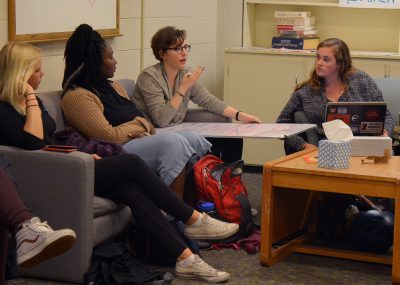
Sitting in a circle of chairs, two dozen Boston University student leaders and activists gathered in the Community Service Center Friday evening to discuss the importance of student activism.
College of Arts and Sciences junior Hanaan Yazdi and senior Rachel Eckles organized the first BU Coalition of Student Activists meeting, hoping to build a strong and united network of activists on campus, Yazdi said.
“Student activists have power,” she said, “[But] because we’re all kind of doing our own thing, we miss a lot of opportunities to work together, collaborate and really support one another.”
Yazdi said after the meeting that she believes groups, if connected, can be more powerful when fighting for causes.
“There are issues at this university that require more than just five or six or even 10 or 20 students to work on them — [these issues] require a full body of students to work together,” she said.
Eckles said that while the organizers respect the importance of solidarity between student groups, they cannot help but notice that collaboration is dying down.
“It’s just really beneficial for the community to have a place where you know that you’ll go there and meet like-minded people [who] believe in activism as much as you do,” Eckles said after the meeting.
The meeting began with some ice breakers; students discussed in small groups about their favorite movies, why they came to the event and how they felt about BU. This led to a larger discussion as the group talked about what had made activism challenging for them on campus.
CAS senior Kimberly Shiu said it was heartening to hear from other activists.
“I was just very encouraged by the idea that there are other student groups who are also, [while] not necessarily having a hard time, but are facing the same difficulties as mine,” Shiu said.
During the discussion, students repeatedly mentioned problems they faced as activists on campus — including the struggle of feeling isolated and discouraged on a large campus, the bureaucratic process that comes with hosting events or getting funding and the general sense of apathy from peers.
These issues have been exacerbated since BU changed its student group funding policy this summer, when The Square was introduced, Active Minds at BU President Marguerite Coles said during the discussion.
The CAS senior is one of many students who talked about the struggle with no longer having any “real” funding and thus having trouble with publicity. Coles said her organization received $30 of funding for all of the publicity for an event.
Jane Dimnwaobi, the BU Student Government vice president of internal affairs, said The Square policy created a hierarchy for student groups on campus.
“The BU Square basically divides student groups into four sections,” Dimnwaobi, a CAS junior, said. “So the higher the group are, basically, the more funding they get.”
While groups in the Bay State category, the “lowest” of the four, do not need an adviser, the only support they receive from the university are $100 in funding for each semester and the right to reserve rooms, she said.
After the meeting, students chatted about other challenges they face, shared information and resources and exchanged contacts with each other.
Na’Amit Tubul, a senior in CAS, said she appreciates spending time with a group of such motivated people.
“It’s really easy to get bogged down by the negative things about BU,” she said. “But my BU experience as a senior has been colored by people who are really involved and really invested in making this place better. Meetings like this remind me that’s something that exists at BU.”
Rachel Schlueter, a junior in CAS, said she saw this meeting as a critical step in improving activism on campus.
“What BU lacks is having this communication,” she said. “There are so many groups trying to do relatively the same thing [with] just no communication.”


























































































































John Sand • Oct 4, 2016 at 3:37 pm
It’s difficult to think of any meaningful contribution activists have made on campus in the last few years. A blocked MBTA last spring? Disruption of a cultural event a few weeks later? Smear campaigns against those who dare disagree with their inflexible ideology? Why should we foot the bill?